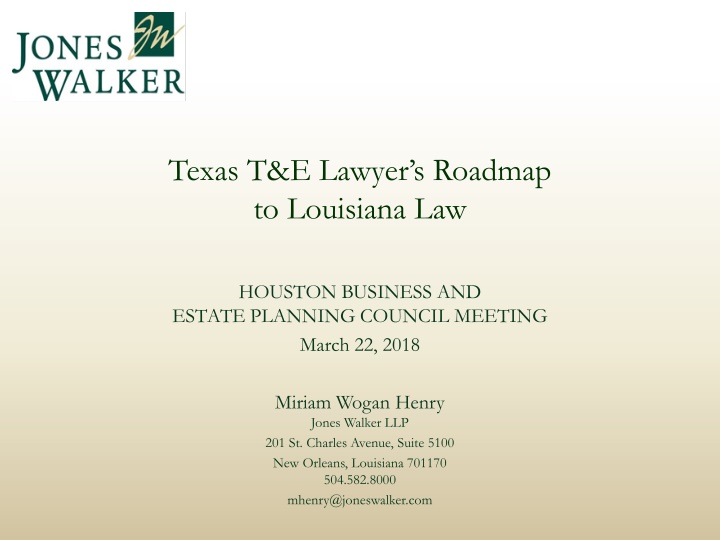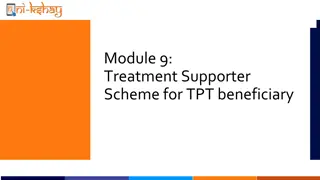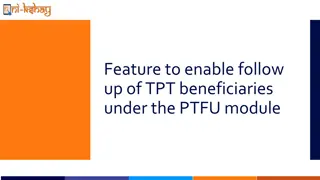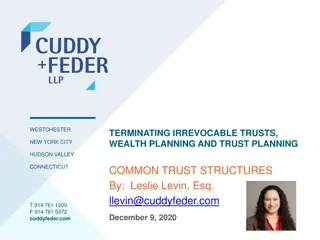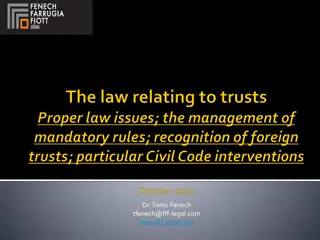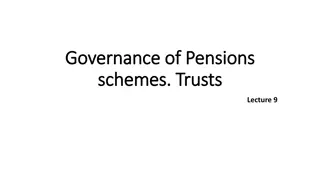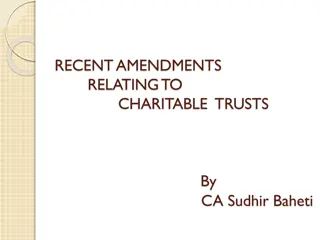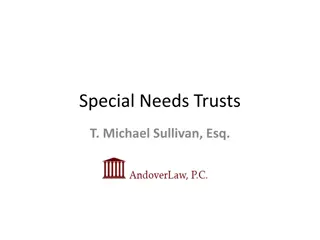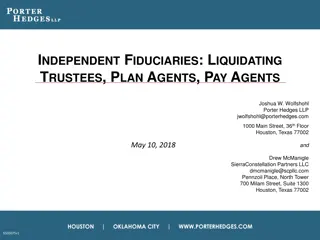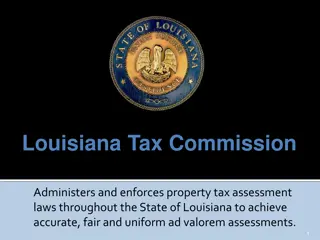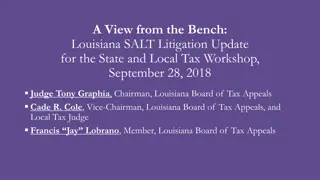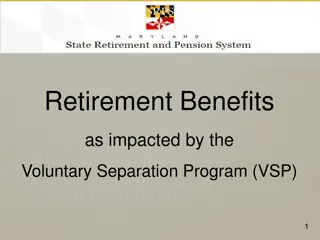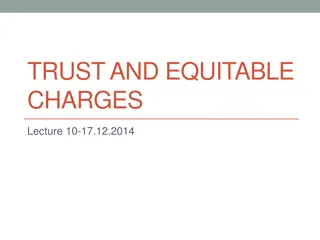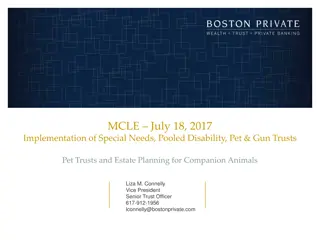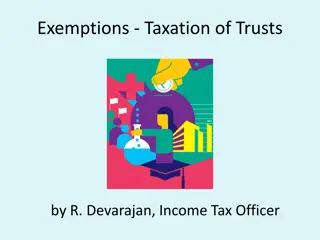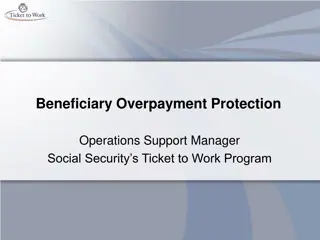Unique Characteristics of Louisiana Trusts: Vested Beneficiaries and Substitutions
Louisiana trust laws have unique characteristics regarding vested beneficiaries and substitutions upon a principal beneficiary's death. The state's civil law tradition influences trust principles, emphasizing heritability and ascertainability of beneficiaries. Specific statutes govern these aspects, allowing flexibility in trust provisions and beneficiary substitutions. Understanding these nuances is crucial for effective estate planning in Louisiana.
Download Presentation

Please find below an Image/Link to download the presentation.
The content on the website is provided AS IS for your information and personal use only. It may not be sold, licensed, or shared on other websites without obtaining consent from the author.If you encounter any issues during the download, it is possible that the publisher has removed the file from their server.
You are allowed to download the files provided on this website for personal or commercial use, subject to the condition that they are used lawfully. All files are the property of their respective owners.
The content on the website is provided AS IS for your information and personal use only. It may not be sold, licensed, or shared on other websites without obtaining consent from the author.
E N D
Presentation Transcript
Texas T&E Lawyers Roadmap to Louisiana Law HOUSTON BUSINESS AND ESTATE PLANNING COUNCIL MEETING March 22, 2018 Miriam Wogan Henry Jones Walker LLP 201 St. Charles Avenue, Suite 5100 New Orleans, Louisiana 701170 504.582.8000 mhenry@joneswalker.com
I. History of Trusts in Louisiana First Louisiana Civil Code, 1808 Based on two principles: Civil law tradition prohibited principle of fedei commissa Civil law tradition opposed deferred vesting of interests Louisiana Legislature did not authorize private trusts until 1920. All trust law in Louisiana is statutory. 2
II. Unique Characteristics of Louisiana Trusts A. Vesting of Principal Beneficiaries A Louisiana irrevocable trust must generally have one or more vested principal beneficiaries who are in being and ascertainable at the time the trust is formed. La. R.S. 9:1803. The rights the principal beneficiaries have in the trust must be heritable, a consequence of vesting. La. R.S. 9:1972. This vesting requirement may cause traditional common law property dispositions to fail. For instance, if the testator provides that the surviving spouse receives an income interest in trust for life and names the principal beneficiaries as my issue, then living at the surviving spouse s death, this principal disposition may result in the property passing by intestacy because the principal beneficiaries were not properly ascertainable and vested at the creation of the trust at the time of the testator s death. 3
II. Unique Characteristics of Louisiana Trusts In limited situations, a vested principal interest may shift to substitute beneficiaries selected by the settlor. La. R.S. 9:1973 et seq. Special class trust provisions allow some additional flexibility and deferred vesting. La. R.S. 9:1891et seq. The settlor may retain the right to change principal beneficiaries in a revocable trust, and when the trust becomes irrevocable, the principal beneficiaries become vested. 4
II. Unique Characteristics of Louisiana Trusts B. Substitutions Upon the Death of a Principal Beneficiary In certain circumstances, upon the principal beneficiary s death, the settlor of the trust may define the substitute principal beneficiaries who take the deceased principal beneficiary s interest, rather than the interest passing to the beneficiary s heir or legatee. Beginning in 2016, substitutions have been generally allowed in favor of the beneficiary s descendants only. La. R.S. 9:1973.A(1). Substitutions in favor of others are generally allowed if the beneficiary dies without descendants, in which case the principal interest may vest in some other person or persons, each of whom shall be a substitute beneficiary. Id. 5
II. Unique Characteristics of Louisiana Trusts B. Substitutions Upon the Death of a Principal Beneficiary However, if the principal interest in trust represents the beneficiary s forced portion, the shift can only occur if the beneficiary also dies intestate. La. R.S. 9:1973.A(1). Substitute beneficiaries are also subject to Louisiana s in being and ascertainable vesting rules. If the substitute beneficiaries are descendants of the settlor, they only need to be in being and ascertainable on the death of the principal beneficiary. Otherwise, the in being and ascertainable requirement applies at the creation of the trust. La. R.S. 9:1975, 1978. 6
II. Unique Characteristics of Louisiana Trusts C. Class Trusts A settlor may vest the income and principal of a trust in a defined class, rather than in one or more specific beneficiaries. La. R.S. 9:1891 et seq. A class may be made of up of some or all of [the settlor s or the settlor s spouse s] children, grandchildren, great grandchildren, nieces, nephews, grandnieces, grandnephews, great grandnieces, great grandnephews, or any combinations thereof, although some members of the class are not yet in being at the time of the creation of the trust, provided at least one member of the class is then in being. Id. Class trusts also allow for an additional means to direct the distribution of principal upon the death of a beneficiary because the trust may provide that the interest vests in the other members of the class. La. R.S. 9:1895. Further, if a member of the class dies with descendants, the trust may provide that the interest of the deceased beneficiary vests in his descendant heirs. The expansive provisions do not all apply to the legitime in trust. Id. 7
II. Unique Characteristics of Louisiana Trusts D. Limitations on Distributions to Income Beneficiaries Who Are Not Principal Beneficiaries If the income beneficiary is not also the principal beneficiary, distributions of principal to the income beneficiary must be limited by an ascertainable standard, even if the trustee is not a beneficiary. La. R.S. 9:2068.A. The policy is to limit the circumstances under which the settlor, acting through the trustee, can impede the rights of a vested principal beneficiary. Exceptions include: (i) the right to withdraw all or part of the principal by request to the trustee, and (ii) the right to receive a stipulated amount or percentage . These exceptions accommodate annual exclusion withdrawals, annuity trusts and unitrusts. Id. 8
II. Unique Characteristics of Louisiana Trusts E. Limited Ability to Modify Trusts A recent update to the Louisiana Trust Code authorizes a person other than the settlor to modify the provisions of the trust instrument in order to add or remove beneficiaries, or to modify their rights, if all of the affected beneficiaries are descendants of the person given the power to modify. This change is a significant expansion of the law in Louisiana. La. R.S. 9:2031. Traditionally, Louisiana has not had the concept of a limited power of appointment. This new provision creates some of the same benefits of a limited power of appointment, albeit in a very limited way. 9
II. Unique Characteristics of Louisiana Trusts F. Trust Term La. R. S. 9: 1831. Limitations upon stipulated term: (1) The death of the last surviving income beneficiary or the expiration of twenty years from the death of the settlor last to die, whichever last occurs, if at least one settlor and one income beneficiary are natural persons; (2) The death of the last surviving income beneficiary or the expiration of twenty years from the creation of the trust, whichever last occurs, if none of the settlors is a natural person but at least one income beneficiary is a natural person; (3) The expiration of twenty years from the death of the settlor last to die, if at least one settlor is a natural person but none of the income beneficiaries is a natural person; (4) The expiration of fifty years from the creation of the trust, if none of the settlors and none of the income beneficiaries is a natural person. A huge exception is the class trust that can last up to four generations. 10
II. Unique Characteristics of Louisiana Trusts G. Form Requirements A Louisiana inter vivos trust must be executed in one of two manners: (i) by authentic act passed before a Notary and two witnesses, or (ii) by private form executed before two witnesses and duly acknowledged. A testamentary trust must be in the form of a valid will. Form is critical in Louisiana. If the form is invalid, the trust will fail and any purported transfer to the trust will be null. If null, the property that purportedly was transferred to the trust during life remains in the settlor s patrimony and passes under the settlor s will at death. If a residuary testamentary trust fails, the trust property passes under intestacy, which often causes many unintended consequences, particularly because the intestate spousal usufruct is not a lifetime usufruct and, therefore, does not qualify for the marital deduction from US estate tax. 11
II. Unique Characteristics of Louisiana Trusts H. Destructibility The Louisiana Trust Code generally does not allow a consent termination of a trust upon the agreement of all parties. Instead, a judicial proceeding is required to terminate a trust, and is only authorized under certain circumstances. I. Powers of Appointment Louisiana generally does not recognize powers of appointment, based largely on the fact that they limit the vesting rights of the principal beneficiaries. However, principal beneficiaries generally have a testamentary general power of appointment to direct the trust principal upon their death. Further, newly revised sections of the Trust Code allow certain modifications, as discussed previously. 12
II. Unique Characteristics of Louisiana Trusts J. Practical Considerations for Non-Louisiana Residents Take all reasonable steps to avoid putting Louisiana immovable property (such as real estate, timber and minerals) into a non- Louisiana trust. Consider using a limited liability company to hold Louisiana real estate. Consider a special provision under the testator s will directing the Louisiana property to individuals, rather than in trust. Or establish a special Louisiana trust (inter vivos or testamentary) to hold Louisiana immovables. 13
II. Unique Characteristics of Louisiana Trusts K. Louisiana Trusts and Forced Heirship Forced heirship generally does not apply to testators who live outside of Louisiana. If a testator has immovable property located in Louisiana and is domiciled outside the State of Louisiana at death, forced heirship will apply only if the testator has a forced heir domiciled in Louisiana at the time of his death. Forced heirship, as it relates to those domiciled outside Louisiana, is limited to the immovables (real property, minerals and the like) located in Louisiana. However, if a testator moves to Louisiana, our forced heirship and community property rules apply. 14
III. Usufructs in Louisiana A. General Provisions of Usufruct/Naked Ownership Law A usufruct is a real right of limited duration on the property of another, namely, the naked owner. La. C.C. art. 535. The usufructuary enjoys the use and the fruits during the term of the usufruct. The naked owner receives the property at the termination. Usufructs can be over consumables or nonconsumables, and the rules governing each differ. The usufructuary has the right to use up consumable assets, the right to all income from consumables, and the ability to alienate/encumber consumables all subject to the obligation to deliver the value the assets had at inception when the usufruct terminates. 15
A. General Provisions of Usufruct / Naked Ownership Law The usufructuary enjoys possession of nonconsumables and enjoys their use, profits and income, but must deliver the assets to the naked owners upon termination. The donor may grant the usufructuary the right to dispose of nonconsumables without the consent of the naked owner, and to treat them as consumables. A usufruct may be granted for life, for a set term or based on an event (e.g. terminate upon remarriage). Naked owners have limited rights to require security from the usufructuary and no rights to current accountings. 16
III. Usufructs in Louisiana B. Considering Usufruct vs. Income Interest in Trust A usufruct can be designed to be comparable to full ownership, giving the surviving spouse broad authority for life, but preserving repayment to the naked owners before the surviving spouse s legatees. Easy asset-by-asset QTIP elections. Simplified management compared to a trust (one less income tax return). But, more risk for naked owners often all security is waived, naked owners have no input on administration, and if the surviving spouse has no assets remaining in the probate estate, naked owners are out of luck. No creditor protection. 17
III. Usufructs in Louisiana C. Tax Aspects of Usufruct The usufructuary reports dividend and interest income directly on the usufructuary s income tax return. Capital gains taxes generally are paid out of the sale proceeds. Typically, the usufructuary receives the amount necessary for taxes from the proceeds and pays those taxes on the usufructuary s return. That being said, perhaps the more correct approach is to file a 1041 for the usufruct and naked ownership relationship and report the capital gain transaction there. For purposes of S Corporations, the usufructuary is treated as the shareholder. A usufruct granted for life qualifies for a QTIP election in the estate tax arena. 18
IV. Right of Habitation and Right of Use The Louisiana right of habitation is the right to reside in the dwelling of another for life or some other prescribed term. Louisiana Civil Code Article 630 defines habitation as the nontransferable real right of a natural person to dwell in the house of another. Rules track the rules for usufructuaries, but do not qualify for the marital deduction from U.S. estate tax. Right of habitation often fits for a couple with children from prior marriages. Right of habitation can be a good vehicle to meet a short- term need. 19
IV. Right of Habitation and Right of Use Louisiana also recognizes another personal servitude known as the right of use. This right is defined in Louisiana Civil Code Article 639 as a right that confers in favor of a person a specified use of an estate less than full enjoyment. A right of use may be transferable and may be heritable in the discretion of the person granting the right. A right of use may be granted to an entity as well. Does not include right to fruits like a usufruct. 20
VI. Louisiana Successions A. Ancillary Succession Administration Ancillary probate is governed by Louisiana Code of Civil Procedure articles 3401 et seq. A foreign will may be probated in Louisiana. La. R.S. 9:2421et seq. 21
VI. Louisiana Successions A. Ancillary Succession Administration An authenticated copy of the probate pleadings from the domiciliary jurisdiction are filed here along with affidavits as to validity of the will and as to jurisdiction, death and heirship. Any non-Louisiana executor must appoint an agent for service of process in Louisiana. La. C.C.P. art. 3097.A(4). 22
VI. Louisiana Successions B. Independent Administration Louisiana law offers a stream-lined procedure for estate administration known as independent administration. La. C.C.P. art. 3396 et seq. Without independent administration, court approval is required to manage property, including sales, leases . Independent administration does not require a bond and only a final accounting by the executor. 23
VI. Louisiana Successions B. Independent Administration Stating in a will that the executor may serve as an independent executor is sufficient to take advantage of the process. La. C.C.P. art. 3396.2. Otherwise, all legatees can agree to independent administration. La. C.C.P. art. 3396.3. The executor must prepare a detailed descriptive list of property, but that may be filed under seal; the final accounting does not need to be filed if waived by the legatees. La. C.C.P. art. 3396.18 and 3396-19. 24
VI. Louisiana Successions C. Closing a Succession Louisiana has no estate or inheritance tax. Once administration (ordinary or independent) in Louisiana is complete, a judgment of possession is issued by the court to transfer the property to the legatees. 25
VI. Louisiana Successions C. Closing a Succession If no administration is required, all of the pleadings may be filed at once (probate, descriptive list, petition/judgment of possession). The judgment must be recorded in each parish where immovable (real) property is located. 26
VI. Louisiana Successions D. Small Succession by Affidavit A non-judicial succession process is available under limited circumstances. La. C.C.P. art. 3431. Available to estates under $125,000 or if the decedent died over 20 years prior. Available if the decedent died intestate. 27
VI. Louisiana Successions D. Small Succession by Affidavit Available to a decedent who died testate and domiciled outside Louisiana, IF the testament has been filed in another state AND the sole heirs are the following: descendants, ascendants, bothers/sisters or their descendants, surviving spouse or legatees under testament probated by court order of another state. La. C.C.P. art. 3431. 28
VI. Louisiana Successions D. Small Succession by Affidavit Contents for the affidavit for a person domiciled outside Louisiana are set forth in La. C.C.P. art. 3432.1. Louisiana C.C.P. art. 3434 sets forth how to transfer movable property using multiple originals of the affidavit. A multiple original of the affidavit with a certified copy of the death certificate can be filed the conveyance records of the parish(es) in which the decedent owned property 90 days after the date of death. 29
VI. Louisiana Successions D. Forced Heirship Children who are 23 or younger at the decedent s death are forced heirs. La. C.C. art. 1493.A. Children who, because of mental incapacity or physical infirmity, are permanently incapable of taking care of their persons or administering their estates at the time of the death of the decedent are also forced heirs. Id. If a child of the decedent died before the decedent AND would have been 23 years of age or younger at the decedent s death, then that child s descendants are forced heirs. La. C.C. art. 1493.B. 30
VI. Louisiana Successions D. Forced Heirship If a child of the decedent died before the decedent AND the predeceased child had a child (decedent s grandchild) who, at the decedent s death, was permanently incapable of taking care of his or her person or administering his or her estate, then that grandchild is a forced heir, no matter how old the child would have been at the decedent s death. La. C.C. art. 1493.C. Permanently incapable reaches persons who, at the time of death of the decedent, have, according to medical documentation, an inherited, incurable disease or condition that may render them incapable of caring for their persons or administering their estates in the future. La. C.C. art. 1493.E. 31
VI. Louisiana Successions D. Forced Heirship The forced portion (or legitime) is one-quarter of the estate if there is one forced heir and one-half of the estate if there is more than one forced heir BUT is not to exceed the forced heir s intestate share of the estate. In certain circumstances lifetime gifts are added back to determine the amount. La. C.C. art. 1495; 1503 et seq. The forced portion may be subject to a usufruct in favor of a surviving spouse and may be placed in trust, including with an income interest in favor of the surviving spouse. La. C.C. art. 1496. The trust code provides special rules for the legitime in trust. See, for example, La. R.S. 9:1841 et seq. 32
VI. Louisiana Successions D. Forced Heirship In limited circumstances a forced heir can be disinherited or declared unworthy. La. C.C. art. 1494, 1500. A parent may disinherit a child for the reasons set forth in La. C.C. art. 1621, including, for example: striking the parent; attempting to kill the parent; as a minor, marrying without the parent s consent; conviction of a crime punishable by death or life in prison; failing to communicate with the parent. Disinherison of grandchild is similar. La. C.C. art. 1622. 33
VI. Louisiana Successions D. Forced Heirship The forced heir must be formally disinherited in the form provided for a valid will and must state the grounds for disinherison. La. C.C. art. 1618, 1624. Reconciliation overcomes a prior disinherison. La. C.C. art. 1624-25. Mental illness is a defense to disinherison. La. C.C. art. 1626. A forced heir can be declared unworthy for killing or attempting to kill the parent. La. C.C. art. 941. 34
VI. Louisiana Successions D. Forced Heirship Forced heirship generally does not apply to Louisiana ancillary successions unless the decedent had immovable property in Louisiana and had a forced heir who was domiciled in Louisiana at the decedent s death. La. C.C. art. 3533. However, if a Louisiana decedent died owning immovable property outside Louisiana, the value of that property is included in determining the forced portion. La. C.C. art. 3534. 35
VI. Louisiana Successions E. Marital Portion When a spouse dies rich in comparison with the surviving spouse, the surviving spouse is entitled to claim the marital portion from the succession of the deceased spouse. La. C.C. art. 2432. There is no absolute definition of rich in comparison but it is generally considered a 5:1 ratio. The marital portion is one-fourth of the succession in ownership if the deceased died without children, the same fraction in usufruct for life if he is survived by three or fewer children, and a child s share in usufruct if he is survived by more than three children. Subject to a $1.0 million cap. La. C.C. art. 2434. Must be sought by the surviving spouse; not automatically granted. 36
VI. Louisiana Successions E. JTROS/P.O.D. Louisiana does not have joint tenancy, tenancy by the entirety or similar concepts. Louisiana has very limited pay on death accounts. Spouses moving into Louisiana need to review account designations and consider interplay with Louisiana law. 37
VI. Matrimonial Regimes A. General Provisions Louisiana s legal or default regime is community property. La. C.C. art. 2327. Spouses moving into Louisiana have one year to opt out of the legal regime with a matrimonial agreement and thereafter court approval is required. La. C.C. art. 2328. A matrimonial agreement must be in the proper form authentic act or act under private signature duly acknowledged. La. C.C. art. 2331. The agreement must be recorded in the parish where the spouses are domiciled and in each parish in which either owns immovable property. La. C.C. art. 2332 38
VI. Matrimonial Regimes B. Community Property Louisiana s concept of community property is broad and all [t]hings in the possession of a spouse during the community are presumed to be community. La. C.C. art. 2340. Community property includes: property acquired during the existence of the [community] through the effort, skill or industry of either spouse; property acquired with community things or with community and separate things [unless the community things are inconsequential]; property donated to the spouses jointly; natural and civil fruits of community property; damages awarded for loss or injury to a [community] thing; and all other property not classified as separate property. La. C.C. art. 2338. 39
VI. Matrimonial Regimes B. Community Property Income ( natural and civil fruits ) from separate property is community property, including minerals, bonuses, delay rentals, royalties and shut-in payments. La. C.C. art. 2339. A spouse may unilaterally reserve the income from separate property as separatewith a declaration made in authentic form or under private signature duly acknowledged. The declaring spouse must provide a copy to the other spouse before recording the declaration. The declaration must be recorded in the parish where the spouses are domiciled and in each parish where the declaring spouse owns immovable property. La. C.C. art. 2339. 40
VI. Matrimonial Regimes B. Community Property Spouses may modify the legal regime with a matrimonial agreement. La. C.C. art. 2328. Modifications are limited in that a spouse cannot renounce the marital portion or alter the order of succession or limit certain rights of spouses to obligate the community. La. C.C. art. 2329- 30. 41
VI. Matrimonial Regimes B. Community Property Separate property under the legal regime includes: property owned before the marriage (or later establishment of a community); property acquired with separate property (and community if inconsequential); property acquired by inheritance or gift to one spouse alone. La. C.C. art. 2341. Separate property under the legal regime also includes: damages awarded due to a breach by the other spouse; things the spouses agree to partition and become separate property; and things one spouse donates to the other to be separate property. Id. 42
VI. Matrimonial Regimes B. Community Property The broad definition of separate property leads to commingling of separate and community property over time. Rights of reimbursement can accrue between spouses also. For example, if a spouse owns income producing separate property that is subject to a mortgage and uses the income to pay the mortgage, a debt is due the other spouse at the termination of the community. Spouses can waive right to reimbursement, but it may be helpful in certain situations (e.g., where there are children from a prior marriage). 43
VI. Matrimonial Regimes C. Separation of Property Regime A separate property regime may be established by a matrimonial agreement or by a court order terminating the community. La. C.C. art. 2370. Spouse are still obligated to support one another and are solidarily liable for necessaries for himself or the family. La. C.C. art. 2372. Spouses may agree in the matrimonial agreement as to how to contribute to the expenses of the marriage. Otherwise, each spouse contributes in proportion to his means. La. C.C. art. 2373. 44
